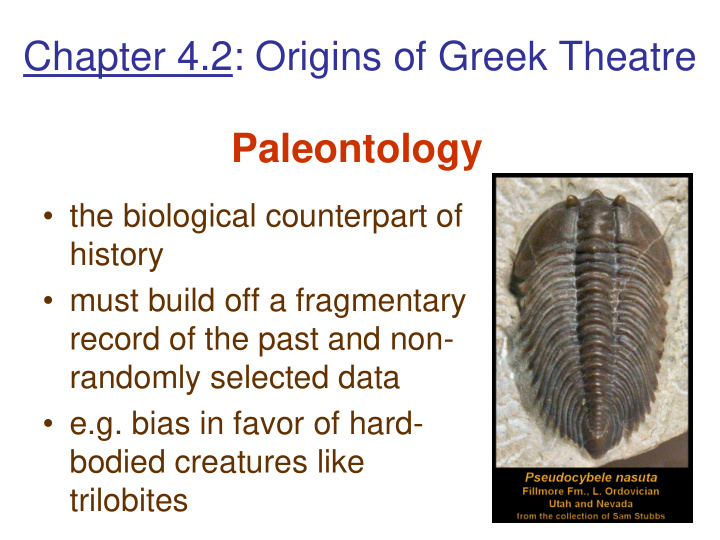



Chapter 4.2: Origins of Greek Theatre Paleontology • the biological counterpart of history • must build off a fragmentary record of the past and non- randomly selected data • e.g. bias in favor of hard- bodied creatures like trilobites
Chapter 4.2: Origins of Greek Theatre Charles Darwin • British naturalist (1809-1882) • “father of evolution” • posited a model of evolution based on gradual change over time
Chapter 4.2: Origins of Greek Theatre Transitional Forms • gradualism predicates the existence of “ transitional forms ” bridging changes in evolution • but these are very few in number, especially near critical junctures like the Permian/Triassic boundary • is it right to use a model of change based on gradualism here or in theatre history?
Chapter 4.2: Origins of Greek Theatre Punctuated Equilibrium • a different model of evolution championed by the late Steven Jay Gould • “punk eek” seeks to address how evolution occurs at the great watershed moments in evolutionary history – equilibrium : long periods of relative stability – punctuation : quick and dramatic disruptions
Chapter 4.2: Origins of Greek Theatre Punctuated Equilibrium • when crises like that at the Permian- Triassic boundary occur, how do species survive at all? • even if individuals are not threatened, their environment and food source/s ( niches ) are endangered • they must adapt quickly or starve – cf. cats/dogs/squirrels model in Chapter 4
Chapter 4.2: Origins of Greek Theatre Fitness • in such a case, what constitutes “ fitness ” for survival • sometimes it is just a fortuitous habit like the “deep sleep” of nautiloids • it can also be nothing more than flexibility and luck
Chapter 4.2: Origins of Greek Theatre Punk Eek and Theatre History • if Frazer can apply Darwinian gradualism in reconstructing cultural history, can we not apply a punk-eek model? • we can if we see Greek tragedy as fitting into an entertainment “niche” – it was one of many genres which over time served the needs of the ancient Greeks for diversion and entertainment
Chapter 4.2: Origins of Greek Theatre Punk Eek and Theatre History • the Greek entertainment “niche” seen evolutionarily: – early dominance of epic, especially Homer – but epic collapses ca. 650 BCE BCE
Chapter 4.2: Origins of Greek Theatre Punk Eek and Theatre History • the Greek entertainment “niche” seen evolutionarily: – lyric poetry rises to fill the “niche” – but its limitations proved fatal in the long run – for instance, lyric poets could not tell long and complex stories the way Homer could
Chapter 4.2: Origins of Greek Theatre Punk Eek and Theatre History • the Greek entertainment “niche” seen evolutionarily: – worse yet, without reinforcement the stories upon which epic had been built could lapse entirely from public conscience and memory – the “niche” was open for a form of entertainment which could be both “lyric” (fast, complex, intense) and “epic” (stately, built around traditional myth, full of gravity)
Chapter 4.2: Origins of Greek Theatre Punk Eek and Theatre History • when applied to the rise of Greek tragedy, a punk-eek model explains our failure to uncover transitional forms • there were very few transitional forms since the change had to happen quickly – they aren’t likely to leave traces because there weren’t very many to begin with
Chapter 4.2: Origins of Greek Theatre Punk Eek and Theatre History • punk eek also allows us to avoid “cultural Darwinism” – the tendency to see modern art as the inevitable and predictable consequence of a civilization’s evolution over time • we can avoid the fallacy of “final forms” – cf. Aristotle’s claim that “tragedy came to a stop, when it attained its own nature”
Chapter 4.2: Origins of Greek Theatre Punk Eek and Theatre History • it also explains the presence of dithyramb • so Aristotle was correct to some extent about the importance of dithyramb • but dithyramb is not the progenitor of tragedy, rather an ultimately unsuccessful rival for the pre-Classical Greek entertainment niche – choruses at heroes’ tombs is another example
Chapter 4.2: Origins of Greek Theatre Conclusion • Greek tragedy was cobbled together from elements already present in the pre- Classical Greek world – complex singing (from lyric poetry) – impersonation and masks (from Dionysus worship) – traditional myth (from epic) • and it had to happen very quickly
Chapter 4.2: Origins of Greek Theatre Conclusion • it was not a direct outgrowth of any of its cultural forebears (Frazer, Murray, Bieber) • but at the same time it owed much to all of them • it also depended on the “genius” of its early founders (Else)
Chapter 4.2: Origins of Greek Theatre Conclusion • but Pisistratus is the most important founder of early tragedy because he gave it official sanction and financial backing • the City Dionysia was part of his program to build the Athenian economy • free to rich foreign merchants visiting Athens and buying Attic wares at the outset of the annual trading season
Chapter 4.2: Origins of Greek Theatre Conclusion • thus, Greek tragedy was the product of a political compromise engineered by a savvy aging Athenian tyrant – it allowed the worship of Dionysus but in an acceptable way – it gave the public a hot, new form of entertainment – it boosted the Athenian economy
Recommend
More recommend